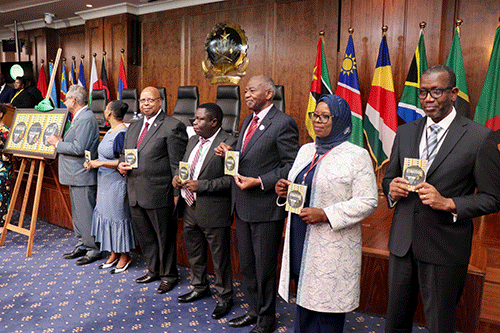George Sanzila
LUANDA – The SADC Parliamentary Forum launched its new strategic plan for 2024–2028 in Luanda, Angola last week.
The strategic plan, which involved input from SADC national parliaments, is a comprehensive roadmap for advancing the organisation’s objectives, and fostering positive change within the region.
It also aims to address pertinent issues such as social development and inclusivity, regional integration and collaboration, as well as enhanced legislative effectiveness.
The Secretary General of the SADC-PF, Boemo Sekgoma noted that the strategic plan serves as the heartbeat of the forum, urging member parliaments to embrace the strategy for the consolidation of democracy and efforts geared towards the integration of the
region.
Speaker of the National Assembly Peter Katjavivi, who led the Namibian delegation, expressed similar sentiments, adding the launch of the strategic plan came at an opportune time when the forum was close to being transformed into a regional parliament.
“We are here to take stock of development efforts in our region. The launch is occurring at a time when we are moving towards becoming a regional parliament. This is extremely important. A regional parliament will play a pivotal role in paving the way for regional integration,” he said.
During the press conference that followed, Princess Kasune, Zambia member of parliament, who is also the justice minister and prominent AIDS activist, announced that Zambia will soon join other SADC countries by signing the Agreement Amending the SADC Treaty, transforming the SADC Parliamentary Forum into a SADC Parliament.
Namibia recently signed the treaty at the SADC headquarters in Gaborone, Botswana, represented by Peya Mushelenga, minister of International Relations and Cooperation.
The agreement requires signatures by 12 SADC member states for it to enter into force.
Namibia was the 10th SADC member state to sign the agreement.
The slow progress of transformation has been attributed largely to a lack of commitment by some countries and other impediments, such as financial constraints.
SADC remains the only region without a regional parliament.
There already exist other organs such as the secretariat (executive) and a tribunal (judiciary), with the legislative arm being the only missing link.
Other regional bodies, such as the Economic Community of West African States (ECOWAS), have regional parliaments, where matters of regional interest and mutual concern are discussed and resolved by parliamentarians at that level.
The theme for the 55th Plenary Assembly is ‘The Role of Parliaments in Promoting Renewable Energy Policies in the SADC Region and Creating a Single Regional Energy Market’.
Apart from the launch of the SADCPF strategic plan, the Plenary Assembly will discuss a wide range of issues, including presentations on the theme, and country reports on progress on the implementation of resolutions of the 54th Plenary Assembly, as well as the consideration of standing committee reports and members’ motions.
Other members accompanying the Speaker include Phillipus Katamelo, Utaara Mootu, Agnes Kafula and Paula Kooper from the National Assembly, as well as John Likando and Olivia Hanghuwo from the National Council.
The Southern African Development Community Parliamentary Forum (SADC PF) was established in 1997 in accordance with Article 9(2) of the SADC Treaty as an autonomous institution of SADC.
It is a regional inter-parliamentary body composed of fifteen (15) parliaments, representing over
3 500 parliamentarians in the SADC region.
These member parliaments are Angola, Botswana, the Democratic Republic of the Congo (DRC), eSwatini, Lesotho, Madagascar, Malawi, Mauritius, Mozambique, Namibia, South Africa, the Seychelles, Tanzania, Zambia and Zimbabwe.
Its main aim is to provide a platform for parliaments and parliamentarians to promote and improve regional integration in the SADC region through parliamentary involvement and parliamentary diplomacy.
*George Sanzila works for the Namibian Parliament in the Division: Research, Information, Publications and Editorial Services.


